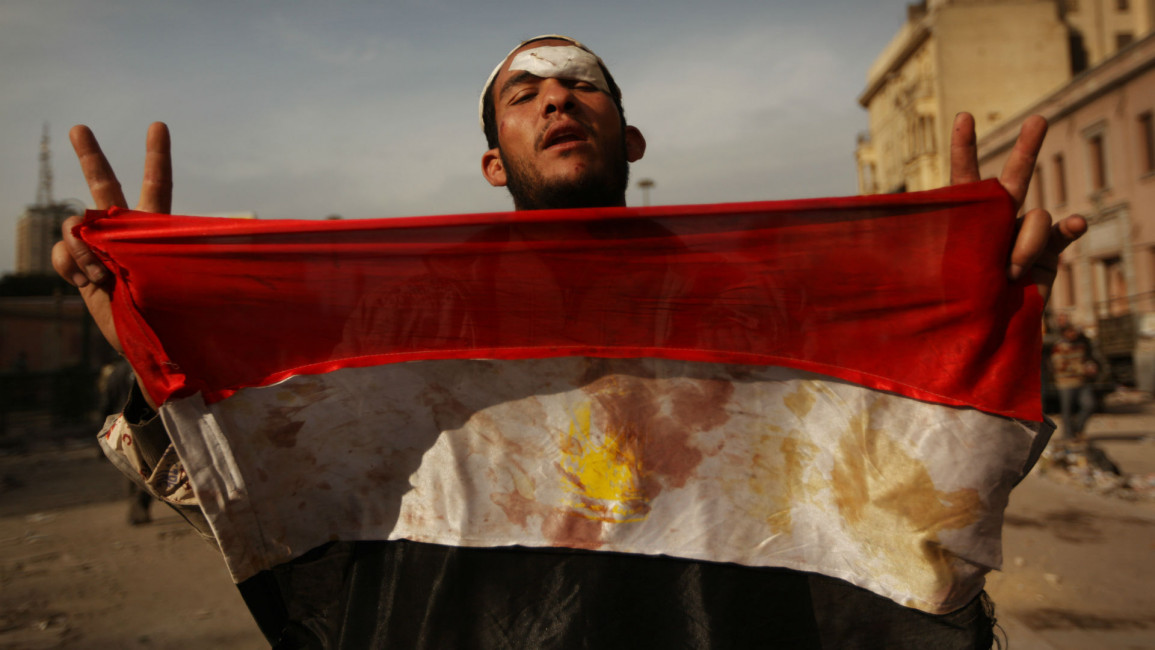
Egypt's revolution endures, but it must change
On the night of 24 January, 2011, a group of young activists gathered at the office of the "Public Campaign for Supporting ElBaradei and Change Demands" in Alexandria to prepare for their own style of celebrating Police Day.
We were divided into three groups to move from three different points calling for dignity and economic rights, in the hope that we would mobilise ordinary people in the lower-middle class areas.
The plan was to avoid confrontations with the security forces, so we excluded chants against Hosni Mubarak from our slogans. We insisted on carrying only the Egyptian flag.
Similar marches were organised in Cairo and other towns. The turnout by "ordinary people", as opposed to political activists, broke all expectations. They, however, chanted against Mubarak and his regime.
When I chanted "Tunisia! Tunisia!", in reference to the revolution there, a young man shouted "Egypt! Egypt!"
| 'Bread. Freedom. Social justice.' Read Al-Araby's special coverage on the Egyptian revolution. |
Four years on, the revolution is regarded as a broken dream by many of its supporters, but this assessment fails to recognise that it was neither planned or a well-organised action.
Critics should differentiate between intent and action itself, between the sacrifices made and the success or failure of achieving the goals of the revolution.
As such, the January revolution should be seen as an act of resistance and not as a shattered "ideal". It is not a discourse about radical change versus political reform, but about rejecting established power structures and establishing a new order.
The act of a physical revolt against the regime is only one of many options, but revolutionaries are still captivated by the romanticism of Tahrir Square and do nothing more than cry over her dead or imprisoned comrades.
They should be aware and recognise that withdrawal from political engagement would be a tactical retreat that would allow them to rebuild their strength and avoid being crushed by the counter-revolution.
A broad sense of resistance
Crowds in streets and squares are easier to measure than withdrawal. However, these are both sides of the same coin.
This was clear when a propaganda campaign attacked the youth for not participating in the constitutional referendum in January 2014. That withdrawal from the process escalated in the presidential electoral skit between Abdel Fattah al-Sisi and his groom, Hamdeen Sabahy, last May.
Sisi sits as the internationally recognised elected president. However, one must not forget he extended presidential polling for a third day in order to increase participation rates - an act that arguably violates the constitution.
| There is an irony that Morsi's opponents argued that his election did not necessarily give him legitimacy, while others fail to say the same of Sisi. |
The revolutionaries underestimate the power of passive resistance. There is an irony that opponents of Mohamed Morsi argued that his election did not necessarily give him legitimacy, while others fail to say the same about Sisi.
Egypt's best young minds desert their country in droves, a new phenomenon that should be considered an act of resistance. Progress in Egypt can not be imagined without these people, just as stability can never be expected without justice.
Betting on economic failure seems to be neither resistance nor ethical. Repositioning the revolution ravages the lives of those who are blamed for letting the revolution down.
In addition, being "passive" does mean being "negative" or hostile against those people whose lives were supposed to be the focus, not the fuel, of the revolution.
Physical revolution is sometimes glorious but it is still a means to an end, and and not a goal in itself.
As Carl von Clausewitz said: "War is not an independent phenomenon, but the continuation of politics by different means". Four years after Egypt rose up, revolutionaries should not neglect the different means to rebel and resist.



